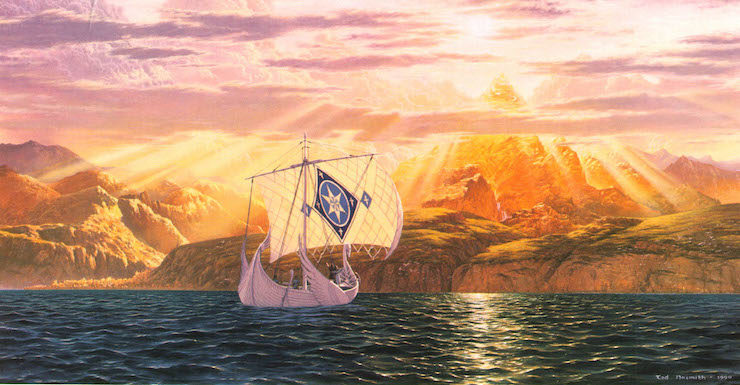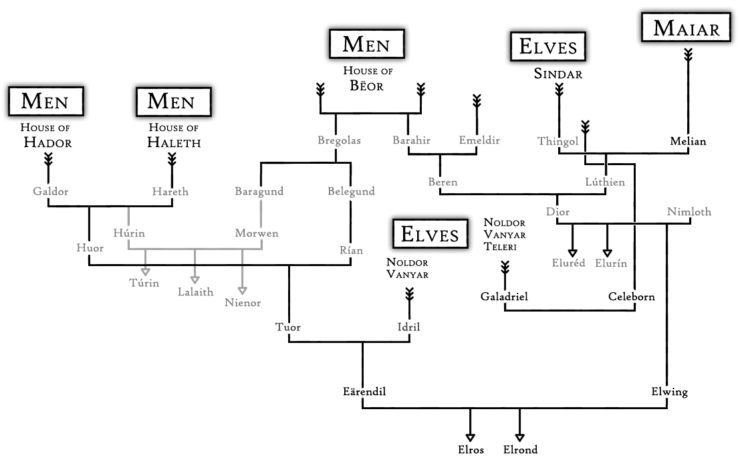In Which Eärendil Boldly Goes Where No Man Has Gone Before, Ulmo Gives Him the Bird, the Sons of Fëanor Go Too Far, and the Valar Have a Group Huddle
The final chapter of the Quenta Silmarillion is upon us, whether we would wish it or not: “Of the Voyage of Eärendil and the War of Wrath” wraps up the First Age with far more drama, conflict, and beauty than the text itself can really contain. Still, after watching Morgoth push the peoples of Middle-earth around for so long, it’s gratifying to see the Valar take action as a team again. That said, although this chapter isn’t especially long, so much important stuff happens that I’ll be discussing it in two installments.
Now, we know from The Lord of the Rings that the son of Idril and Tuor—Eärendil the Blessed, Eärendil the Wanderer—is a mariner. We know because one day Bilbo will sing a song about him in Rivendell. He’s a legend among legends. Poetic and dreamlike in quality, Bilbo’s rhyme of this ancient mariner paints a lovely picture, but it’s not even half the full story—which The Silmarillion gives us, at least in cursory form.
Dramatis personæ of note:
- Eärendil – Half-Elf, of mariners most renowned
- Elwing – Half-Elf, jewel-bearer, fine feathered friend
- Maedhros – Noldo, one-handed son of Fëanor (eldest)
- Maglor – Noldo, two-handed son of Fëanor (next eldest)
- Eönwë – Maia, herald and apparent bailiff/gopher of Manwë
- Manwë – Vala, honorable judge presiding
- Mandos – Vala, Doomsman, prosecuting attorney, rules lawyer
- Ulmo – Vala, attorney for the defense
Of the Voyage of Eärendil and the War of Wrath
We pick up pretty much right where the last chapter left off, with Tuor and Idril having sailed off into the sunset toward the West and out of all eyewitness accounts. In their absence, their son Eärendil has become the lord of the “gleanings” of the Elves. These are the refugees from Doriath and from Gondolin. And they live now in the Havens of Sirion.
Eärendil, as the son of a Man favored by Ulmo, the Lord of Waters, is a natural-born mariner. Though, I must say, it’s a little surprising that he goes down in history as the greatest of all mariners, yet he hasn’t got a drop of Teleri blood in him. I mean, we all know how much Teleri love water and ships. (Clearly no Teleri were on the editorial board of Elves who handed down the history and legends of the Eldar that is The Silmarillion.) But nope, Eärendil’s Elf-mom was a mix of Vanyar and Noldor only. Still, there are Teleri nearby while he’s growing up. Most notably, Círdan the Shipwright and his people. They live just across the bay on the Isle of Balar.
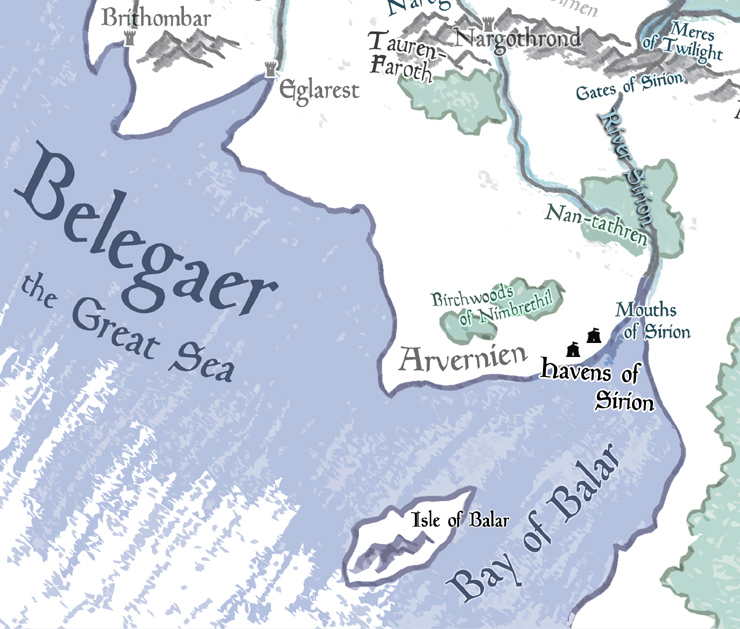
Círdan, it should remembered, is an elder among Elves, who even met Ulmo (a few times!)—not to mention that oceanic Maiar couple, Ossë and Uinen. Bottom line: Eärendil’s likely had the best of the best Teleri show him the ropes. Well, the best of what’s left. It’s slim pickings nowadays among the Eldar.
In a move that at first sounds political but sure isn’t when you see the love these two share, Eärendil marries Elwing. Elwing is the daughter of the late Dior and Nimloth, and thus the last surviving grandchild of Beren and Lúthien. She is also, by the way, the wearer of the Silmaril (presumably still housed in the Nauglamír), which alone would make her a pretty popular girl among her people. Given her heritage, Elwing has Sindarin (formerly Telerin), mortal, and Maiar DNA! So when she and her husband have two sons together, those kids bring a heck of a lot of ancestry together.
Enter Elrond and Elros—and they’re the first two officially called the Half-elven! Check it out.
Next we’re told that that Eärendil can’t sit still. He’s got to get out there and ride the waves, and even when he sails up and down the coast on many adventures, it’s not enough. He’s restless, “longing for the wide Sea,” and driven by two significant things: (1) A desire to find his parents, who never did come back. Maybe they never meant to stay away? Did something untoward happen? Can he help? (2) A desire to try to find “the last shore”—that is, the shores of the land where the Valar dwell—to seek their aid before dying.
Dying, it must be understood, is absolutely the expectation of anyone who can even reach said shore. Which surely only fuels Eärendil’s concern for his parents. His dad, who was close personal friends with the Lord of Waters, probably told him some stuff about the whole exiled Noldor business, and of the prophecy spouted by Mandos. Valinor was shut against them, and that’s for the noble Calaquendi. But mortal Men? No way, Josë. Eärendil himself is only half Elven. So yeah, anyone who even attempts to find Valinor has their work cut out for them. Every time Turgon of Gondolin sent out ships into the West, none ever came back (except Voronwë, and just barely!). So Eärendil figures, even if he finds the continent of Aman, there’s no way he’ll be allowed to step foot on it without repercussions, let alone make it back to Middle-earth afterwards.
Still, he wishes to attempt it, for everyone’s sake. So he needs a ship, a really good one that can go the distance. And who better to see a ship wrought right than with the rightful help of Círdan the Shipwright? Who knows how long it took to craft, but the end product is white-hulled, golden-oared, silver-sailed Vingilot, a.k.a. Foam-flower, “fairest of the ships of song.” This is the pièce de résistance of Elven maritime masterworks! But it’s probably fair to say that while this may be the greatest single ship ever made by Children of Ilúvatar, it’s not necessarily greater than that entire Telerin fleet of magnificent white ships from Alqualondë—you know, the ones Fëanor torched as a parting “eff-you” to his own kin and followers.
Anyway…when Eärendil finally sets sail, his wife remains behind with their sons, who are still very young—too young for any sea voyaging, and especially too young for what may be a suicide mission. As a husband and father, I frankly cannot imagine how sorrowful his departure was. Very much like going to war, perhaps, one where the prospect for survival is…not good. Eärendil’s voyage is a sacrifice, a one-way trip into the deathly unknown. And though his heart yearns for the open Sea, even in the best of times, there’s only so much fun you can have without the ones you love most with you.
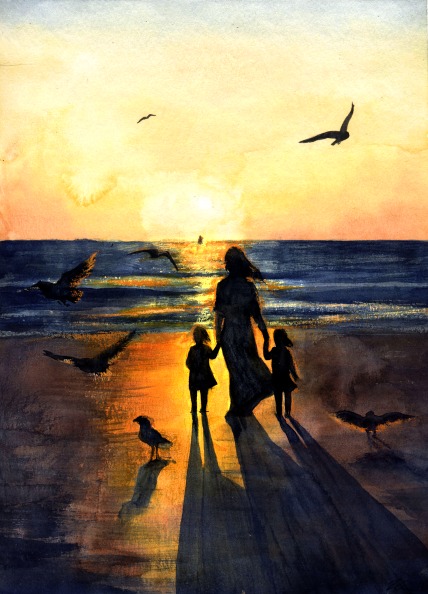
Still, there are three mariners who go with him—a small but loyal crew. These guys may or may not even be Elves. Tolkien never tells us! Some theorize they’re of the Edain, some of whom also dwelled at the Havens of Sirion. Certainly we know that there are still Elf-friends around—we know because they’re going to come up again later in this chapter, and also because who else will go on to join Elros in founding the great seafaring kingdom of Númenor?
A few years go by as Vingilot navigates Belegaer the Great Sea. Who knows what odyssean adventures these four mates have? What does the horizon look like when the world isn’t [yet] an actual globe? How many times can you sing “100 Bottles of Wine On the Wall?” before you go crazy? In Tolkien’s earlier iterations of these voyages, Eärendil has some incredible escapades…up to and including meeting and battling Ungoliant herself in the far South of the world, suggesting that that she yet lived, at least up until then! But alas, as much as we want to know what Eärendil has seen of Arda and its seas (that we never get to), what matters is that he’s already been living a hard but adventurous life.
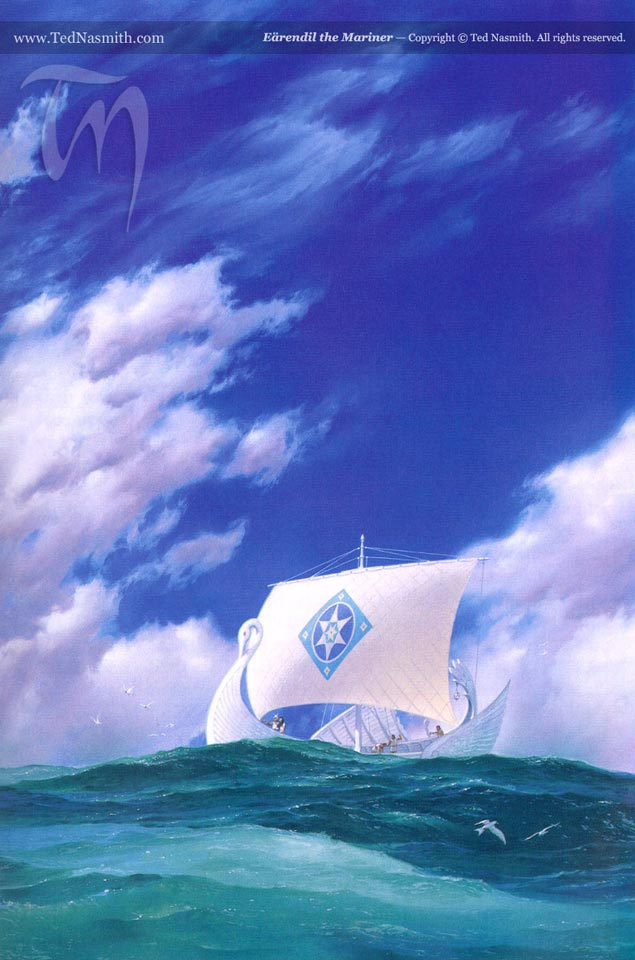
Eärendil never finds his parents on these voyages, and when the ship goes far enough west that Vingilot might conceivably approach the fabled Undying Lands, shadows, enchantments, and winds drive the ship back again. The Valar aren’t joking around with their defenses. Here we’ve got the one dude truly invested to overcome these challenges by one of their own (Ulmo) and still the Valar aren’t letting him through. Tough crowd, these Lords of the West.
But after having his bowsprit forced back towards Beleriand, Eärendil hurries east again. Dreams have inspired a panic in him. Something’s wrong back at the homefront…
And indeed, something is very, very, very wrong. Maedhros, eldest son of Fëanor, has become tormented by the temerarious Oath that has driven his family down its long and destructive path. It’s just him and his three remaining brothers now, living nomadic hunters’ lives with some staunch followers, warriors, and hangers-on. But see, since the fall of Doriath, Maedhros has been stalling. Already guilt-ridden from that second kinslaying event, which hadn’t even yielded the goddamned Silmaril that had forced his hand in the first place, he clearly wants to avoid more bloodshed. And for a few years, he’s had no clue where it is, so he could just relax.
After all, that infernal Oath sure is unambiguous concerning what to do if anyone if anyone is caught holding, taking, or keeping a Silmaril. Let’s go back to the chart.
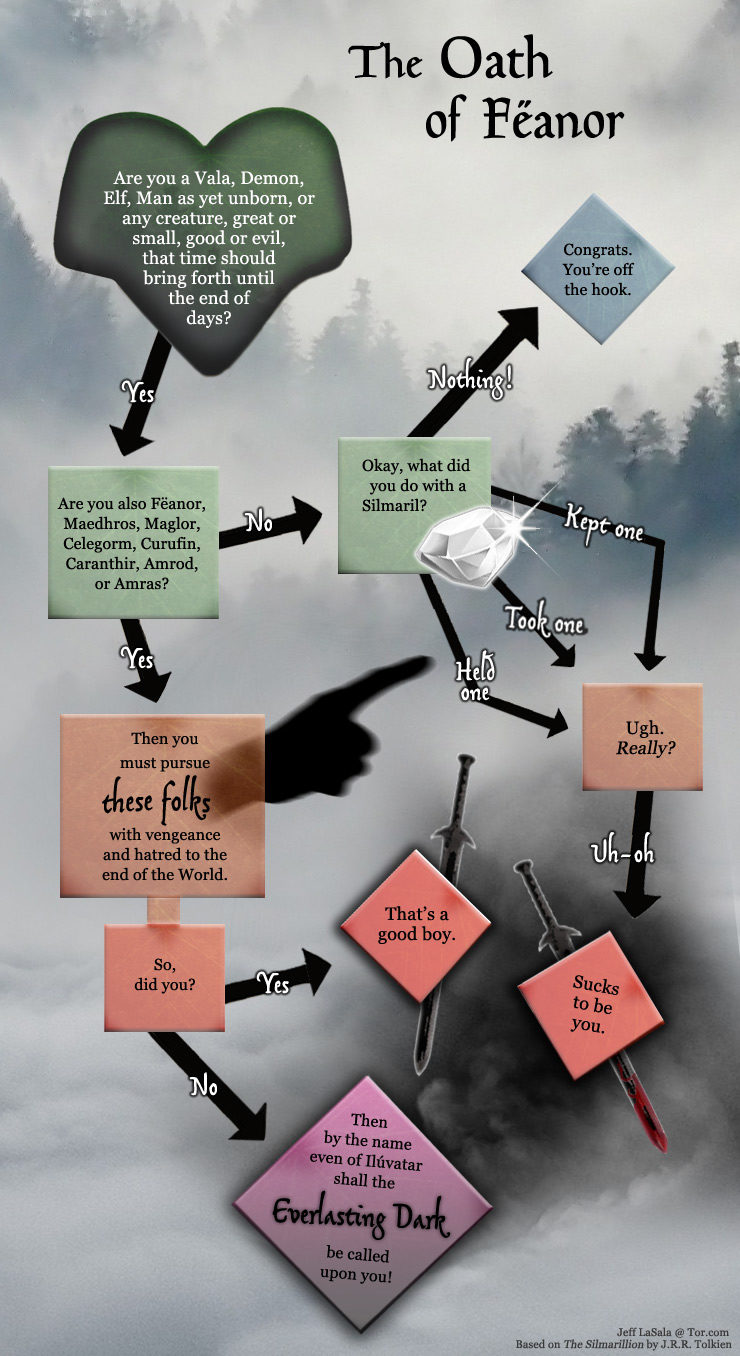
Still, if a Silmaril is just missing, well…maybe no action is needed. But then Maedhros learns that Elwing, daughter of Dior, had survived. And, in fact, has his dad’s jewel down there with her at the Havens of Sirion. Well, shit.
So first he tries diplomacy to get it, sending her messages “of friendship and yet of stern demand” to give it back to his family. But neither Elwing nor her people give into this bullying, believing that the gem belongs rightfully with the descendants of Beren and Lúthien, who actually took the hallowed gem from the real thief: Morgoth. And especially while their lord, Eärendil, is shipped out. As the last remnants of the Eldar from Gondolin, Doriath—and let’s not forget doomed Nargothrond—have gathered together at the edge of Beleriand, joined in solidarity in hoping for pardon from the Valar and protection from the Dark Lord, they reason that this is no time to be giving up one of the few treasures they have. Whether this is the right call or not doesn’t matter. They believe it is a treasure of holy power and healing, more than just a shiny rock.
But Maedhros feels compelled to act, coerced by the legacy of his father and the epic power of the Oath. If he doesn’t go with force of arms to claim the Silmaril, as he swore to his dad twice and with (they claim) Ilúvatar as witness, then “shall the Everlasting Dark be called upon” him. Damned if he does, damned if he doesn’t.
We’re not given any details about this attack. We just know that Maedhros, Maglor, Amrod, and Amras come rushing down with their loyalists and spark the third and “cruellest of the slayings of Elf by Elf.” Fascinatingly, a few of their own servant-warriors desert them—almost like when the Dwarves of Belegost refused to take part in the deeds of their Nogrod brethren. Some even switch sides and fight back. Even to them, this is just so wrong, to be fighting the last vestiges of the Elves of Beleriand. Yet the sons of Fëanor stick to their guns, hold to their Oath, and kill those who would withhold the Silmaril. Amrod and Amras are both slain in turn, but the Havens are largely dispatched.
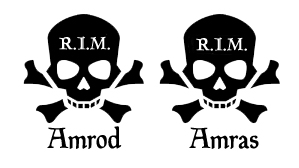
Little Elrond and Elros, as young now as Elwing had been when Doriath fell, are taken captive by Maedhros! He will, at least, not allow them to be harmed. But Elwing, seeing her children taken alive, faces a choice: she can surrender to her enemies, lose the Silmaril, and if she’s lucky she might be spared. Who’s to say? She might give up the jewel and still be killed. Or…she can sacrifice herself to keep the holy gem from them. Between the devil and the deep blue Sea is she! This is surely not an easy choice, but she does make the call and she’s out of time.
She casts herself into said Sea and is thought lost. She falls, no doubt dramatically and from some high precipice, in full sight of Maedhros. The sons of Fëanor are once again denied. Ever dangling before them is that deadly carrot.
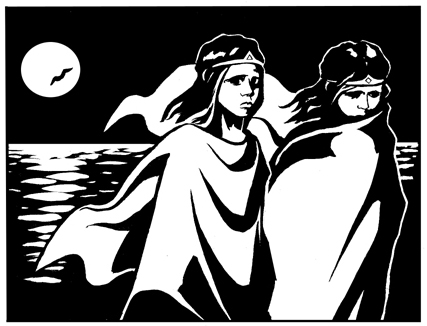
Círdan, along with Gil-galad, the son of Fingon and last High King of the Noldor (such as they are), eventually arrive by ship to aid the Havens, but the battle’s already over. Maedhros and Maglor and their much-dwindled force have withdrawn, the two Elf-lads with them. But Maglor’s heart, no doubt remembering the fate of Dior’s two sons, “was sick and weary with the burden of the dreadful oath,” and so he has no interest in harming these kids. He will raise Elrond and Elros as his own. It’s an unfortunate scenario, but one he will make the best of.
But back to Elwing. She had fallen, had expected to die…but Ulmo’s got her back. See, her sacrifice has been made and the Silmaril, in her act of defiance, has now been removed from the shores of Middle-earth, carried out over the waves…fully into Ulmo’s domain.
Elwing’s body does not break upon the rocks or waves below. Instead Ulmo pulls the trigger on some of his great Valar power and straight-up transforms her into “a great white bird,” maybe a huge seagull, or a big albatross, or even a swan such as those her father-in-law, Tuor, saw up in old Vinyamar some forty years ago.
And since she’d been wearing the Nauglamír when she’d jumped, “upon her breast there shone as a star the Silmaril.”
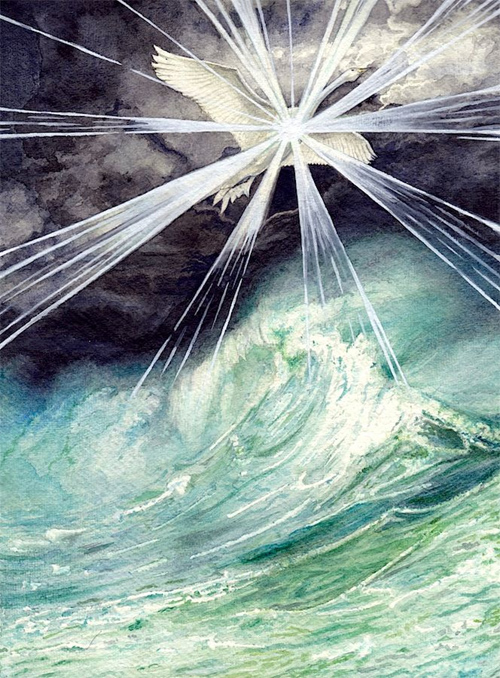
Thus enchanted, Elwing flies by night away from there, seeking her husband way out on the dark Sea. And indeed, eventually the east-sailing Eärendil spots her from afar though he doesn’t know who or what it is: she’s an unearthly sight to behold in a glowing cloud of light. Truly, it’s the stuff of poetry.
And it is sung that she fell from the air upon the timbers of Vingilot, in a swoon, nigh unto death for the urgency of her speed, and Eärendil took her to his bosom; but in the morning with marveling eyes he beheld his wife in her own form beside him with her hair upon his face, and she slept.
I’m pretty sure no other Child of Ilúvatar has ever transformed into a bird before anywhere in Arda. So that’s a first. Probably never to happen again…
Well, back in her original form, Elwing wakes in the morning and tells her husband what’s happened. This is surely a moment of embattled hope and fear for them both, for while the couple is reunited unexpectedly, their people seem utterly lost. Worse: their sons have been taken captive and there’s no knowing if they’ll be spared or put to death by the sons of Fëanor! Do they go back for their kids, or do they try to see this mission through? If they succeed, then the best chance for their sons, and for all of Middle-earth, is the aid of the Valar. If they fail, well, everyone’s kind of screwed at this point anyway. Who the hell is even left to save, or is worth saving?
It must royally suck to make this call, but Eärendil chooses to resume his original quest. Bilbo’s famous song about Eärendil the mariner who “tarried in Arvernien” sure doesn’t mention the anxiety that must be running through him, as it would any good parent.
So they turn Vingilot around and aim for the West. At least Eärendil has his wife at his side. Whatever happens, whatever perils await them, they’re all in the same boat now. And that includes the three other members of Vingilot’s crew.
As they journey on, Eärendil takes to wearing the Silmaril on his brow—applied directly to the forehead!—presumably in some form of circlet. You know, just like Fëanor himself did in the good old days! Interestingly, of the Nauglamír itself there is no longer any mention in any tale. Maybe it was lost in the Sea when Elwing took her dive, or perhaps—as Eärendil superfan Shawn Marchese has idly speculated—it was simply absorbed into her bird-form at Ulmo’s prompting. Regardless, with the jewel of Fëanor now blazing like a miner’s headlamp, this fateful voyage wends towards its destination. The Silmaril glows brighter as Valinor draws nearer, as if calling to the realm where it was made…and to the memory of the Two Trees that gave it its light.
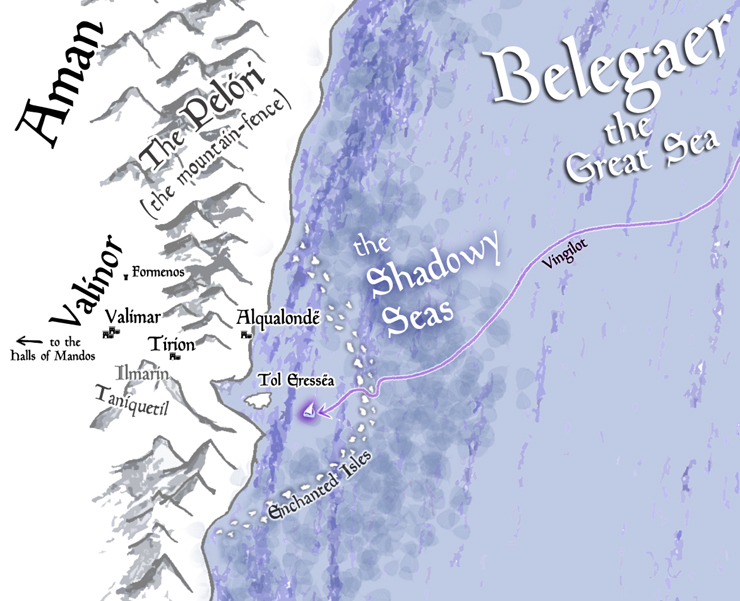
So it’s due to the presence of the Silmaril that Vingilot is now able to venture through the Shadowy Seas near Aman and navigate through the misdirecting power of the Enchanted Isles, that semicircle archipelago the Valar had raised long ago, after the Noldor departed. The Silmaril was the final necessary component for this fateful trip (that started from old Sirion aboard this tiny ship). Good job, Elwing, for bringing it to Vingilot, and good job, Ulmo, for allowing her to!
At last, they see Tol Eressëa itself: the Lonely Isle that had been Ulmo’s ferry for the Vanyar, Noldor, and Teleri in ages past. Here a bunch of Teleri still dwell, and they in turn spot the ship-carried Silmaril gleaming from afar. Unlooked for. Unexpected. The Teleri are amazed! (The Teleri are always amazed.)
Eärendil and his team continue sailing past the Lonely Isle and right up to the shores of freakin’ Valinor itself!
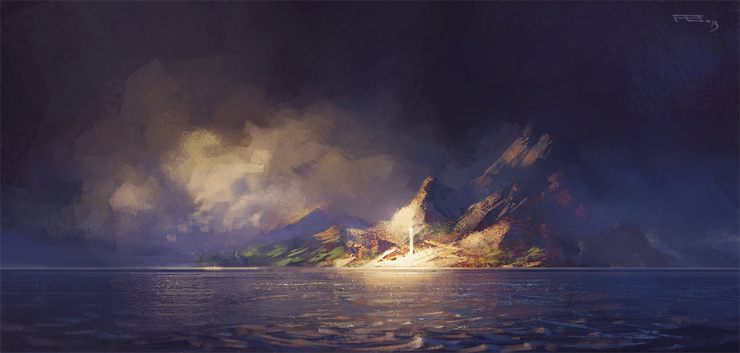
This is HUGE. And a point of no return. Before anyone disembarks, Eärendil tells his wife and his three mates to sit tight, right there on the boat—absolutely do not set a foot on the land itself. Doing so would be officially breaking the rules and could incur the wrath of the Valar. But incurring their wrath is why Eärendil himself has come, knowing the risks. It’s the only way. He’s here to represent the Men and Elves of Middle-earth. All of them, and that includes those no-account sons of Fëanor, who for all Eärendil knows have murdered Elrond and Elros. Eärendil is trying to think big here, and put the needs of the many against his own.
But Elwing isn’t having him walk away alone, just like that. As he steps ashore, she tells him how it is, first with words, then with action. Channeling a bit of Grandma Lúthien, if you ask me.
‘Then would our paths be sundered for ever; but all thy perils I will take on myself also.’ And she leaped into the white foam and ran towards him; but Eärendil was sorrowful, for he feared the anger of the Lords of the West upon any of Middle-earth that should dare to pass the leaguer of Aman.
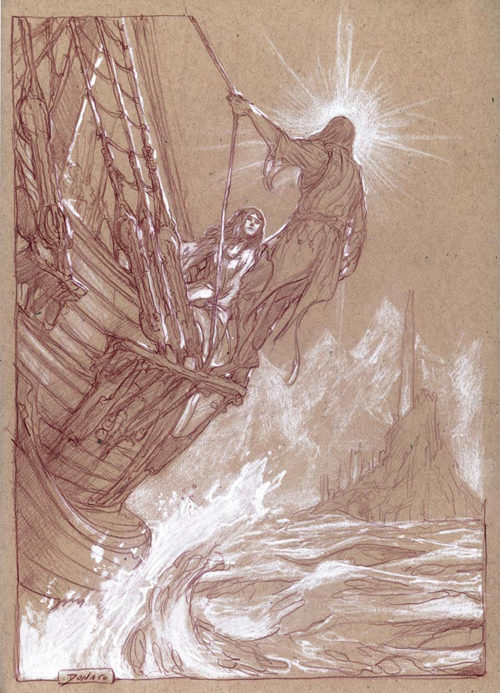
Tolkien’s males really run the spectrum, but his females are always something else. Consistently memorable, rarely passive, sometimes eight-legged(!). Eärendil does convince Elwing to wait at the ship, though, by reminding her that only one person can bear the message to the Valar. Or so it’s been said! This echoes back to what’s written in the previous chapter, and what the much-vaunted “wise”-guys have said about this doom-filled errand. That “only one speaking in person for the cause of both Elves and Men” could do it. This pacifies Elwing…for now.
So alone Eärendil goes on towards the Blessed Realm, first hiking through that great cleft in the mountains which the Valar had carved ages ago to allow the light of the Two Trees—back when that was a thing—to be seen by the Teleri on their island. Then he heads up the great hill, Túna, on which the ancient city of Tirion still stands. By this point he’s gotten himself covered with dust, but this isn’t your standard-issue road dust. It’s Valinorean diamond dust, thank you very much, likely kicked up from the road. Remember, Valinor is a place where gems galore have been pulled from the earth by the Noldor, not hoarded but given freely away for their beauty alone. Even the Teleri simply tossed diamonds on their beaches just to pretty them up; there’s no currency in the West.
As for Tirion itself, this is the city that was first made for both the Noldor and the Vanyar, but then the Vanyar eventually drifted away to be closer to the Two Trees. They chose to live in the plains and woods and the slopes of Taniquetil, the Holy Mountain upon which Manwë and Varda both dwell. Thus Tirion had become the Noldor’s city alone, and when Fëanor led the majority of its people into exile, a fraction of the Noldor remained there.
And that’s where Eärendil now enters, strolling right through the gates with no one to greet or even rebuff him. Which seems…odd. And when he walks through the conspicuously empty and silent streets of Tirion, surely he gets a flash of déjà vu. He’s never been here, of course, but he has been in Gondolin, which his grandfather, Turgon, had designed in memory of this city. It was nearly as glorious, with its white stone walls and terraces, crystal stairs, and lovely fountains. Granted, Eärendil was seven years old when Gondolin was besieged by Morgoth’s armies, but the resemblance—or at least the style—has got to be uncanny. If there’s one thing the Noldor do well, it’s artistry and architecture.
And while the text doesn’t call it out in this particular chapter, it’s worth remembering that in the courtyard of Tirion’s silvery lighthouse tower, there is a very special white tree that was made by the Vala Yavanna, Giver of Fruits. Galathilion it was named, and it’s the forebear of every white tree we’ll hear about—right down to the ones talked about in The Lord of the Rings. So this is the place of true majesty where Eärendil is walking.
But hey, where is everybody?
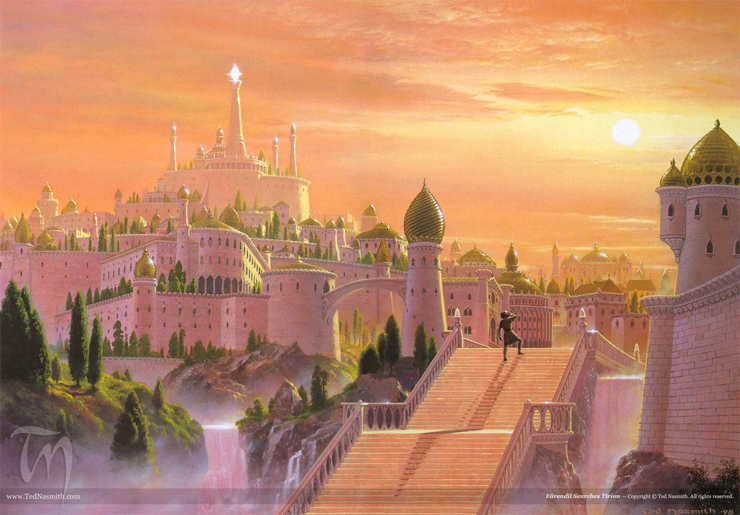
Now a terrible thought comes to mind: what if something terrible happened even here in Valinor, too?! What if this errand was in vain because even the land of the Valar has somehow been overthrown? Yet the city itself is pristine; this surely hasn’t suffered the same fate as Gondolin. He starts to call out, in every language he knows, but receives no answer. Everyone seems to be gone…even the street sweepers and lamplighters! At last he leaves Tirion upon Túna and heads down the road, back toward his ship, his wife, and his crew. Dispirited, heavy in heart.
Yet our hero has already been noticed. He’s kind of hard to miss, frankly. Not only is he walking around with a beaming Silmaril strapped to his head, the diamond dust he’s picked up like so much glitter is now shimmering in its hallowed light. No sparkly vampire, Eärendil is a one-man, walking luminous cloud! And actually, it just so happens to be a time of festival, so nearly all the Noldor of Tirion are out of town partying with their Vanyar friends. I bet they don’t even lock their doors when they vacate their city.
But when whoever was still skulking around Tirion—maybe some of the aforementioned street sweepers?—saw him, they hurried off to Valimar with the news: a glowing man with an amazing head-light has come! Valimar (also sometimes spelled simply Valmar) is the city “of many bells” situated right next to where the Two Trees had once been. As the center of Valar and Maiar community, Valimar is where the festival is going on right now. Olórin is surely there, and Curumo, and the other future Wizards. Heck, even Melian could be there now…though I’m guessing she’s more likely idling in the Gardens of Lórien, waiting for the spirit of slain Thingol to be re-embodied. Who knows?
Anyway, it’s Eönwë, the personal herald of Manwë, who goes forth to greet Eärendil. We haven’t heard from this guy since the really early days! From the hilltop behind Eönwë calls out with his unearthly Maiar voice:
Hail Eärendil, of mariners most renowned, the looked for that cometh at unawares, the longed for that cometh beyond hope! Hail Eärendil, the bearer of light before the Sun and Moon! Splendour of the Children of Earth, star in the darkness, jewel in the sunset, radiant in the morning!
Lovely titles, eh?
Note that the folks of Valinor seem to have been expecting or at least hoping for him—he is both “looked for” and “longed for”—but he’s surprised them, after all, since he’s arrived now not when they had a welcome party prepared but when they were having a festival. Either he’s early or he’s late. He’s come “at unawares,” and they’re glad of it.
Well, with Eönwë’s greeting of high praise at last delivered, everything changes. Eärendil is now summoned before all the Valar over in the city of Valimar, where I have to think the festival grinds to a sudden but eucatastrophic halt and everyone who isn’t a Vala stares in wonder at this Half-Man (the likes of which few here have ever seen!) who allegedly sailed right up to the shores of Aman. You know, this same continent whose already lofty defenses were leveled up when Morgoth and Ungoliant went skulking away quite some time ago!
Almost certainly the meeting is held at that great circle of thrones called the Ring of Doom. Even Ulmo is called in for this emergency session. If this story was a novel, there’s no way Eärendil wouldn’t be constantly trying to pull Ulmo aside to ask about his parents, but at the moment there are bigger fish to fry (Morgoth maybe?). And let’s be clear: this is the highest and most important thing happening on Arda right now. But Eärendil is ready for this, and so he delivers his speech to the Valar, “the errand of the Two Kindreds” that he represents as both half Elf and half Man.
He asks for pardon for the Noldor and pity for their “great sorrows,” and mercy in general for all Men and Elves—remember, the Sindar never rebelled and never kinslayed (except in self defense). Eärendil has come all this way to ask for help, even though there are such a small number of Elves left in Beleriand anyway. I think it’s important to note, as others have before, that at no point does Eärendil say “…except for those jerk sons of Fëanor, who would murder my family. Screw them!” Though Eärendil is a grieving father, knowing nothing of the fate of his kids, he has swallowed his pride and entreated the Valar to forgive everyone.
And when he’s finished, Eärendil’s “prayer was granted.”
We’ll get to the how of that soon, but there is still the matter of Eärendil’s own fate. He is dismissed from the Ring of Doom and allowed to go back to find his wife. Instead of fretting by the shoreline for him the whole time, Elwing eventually brought Vingilot (with those three other mariners still inside) over to the Swanhaven, Alqualondë. There she was befriended by the Teleri, and she filled them in about all the crazy goings-on and woes of Beleriand. Remember that Alqualondë was the site of the original Kinslaying, the port city where Eärwen—mother of Finrod and Galadriel—came from.
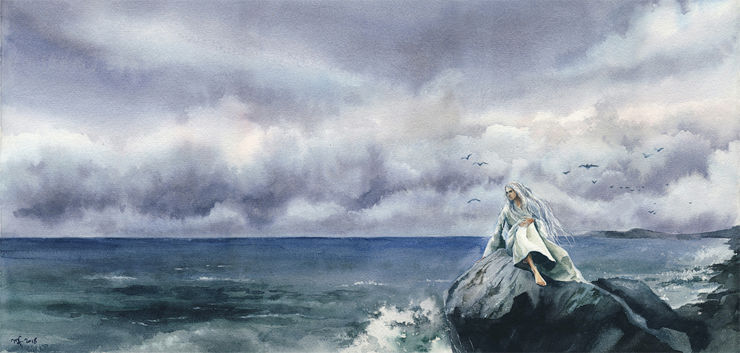
In any case, the Valar remain in their Ring of Doom to discuss the lofty business of life, death, and the afterlife. See, Mandos the Doomsman is a stickler for the rules, and it’s been said that no mortal Man—which despite his Elf-blood Eärendil is (at least on paper)—should be allowed to “step living” upon Aman. But Ulmo’s got his back, possibly dons a barrister wig, and speaks up in Eärendil’s defense, pointing out that this dude is special. He was essentially born to come here and speak on behalf of the Children of Ilúvatar, in fact did so selflessly, and as you can see from Exhibit A (a meticulously drawn family tree maybe?), Eärendil is just as much immortal Elf (from his mom’s side) as he is mortal Man (from his dad’s side). To which Mandos basically fires back that yeah, he is, but that Elf side is like super tainted with Noldorin blood, and the Noldor, we may remember, is a group of no-good know-it-alls “who went wilfully into exile” and who “may not return hither.”
Judgy Mandos is a tough crowd. Though one could think that Mandos didn’t do his math, since Eärendil’s grandmother was of the Vanyar, and her dad’s mom was, too. But the final judgment, as always, falls to Manwë, who probably does have all the numbers right and knows what’s what. And so he decrees that neither Eärendil nor Elwing will be punished for trespassing, since the former came out of love of the Two Kindreds and the latter came out of love for him. But…but…they also cannot return to Middle-earth.
We’re not privy to the discussions after this point, but the Valar must come to an agreement about Eärendil, the Silmaril on his head, and Vingilot itself, because what follows is nothing less than a cosmic event of great spiritual significance. The Valar fetch Eärendil and the missus back to Valimar to hear their sentencing—which isn’t so bad, as legendary “punishments” go. But this fate for our heroes is so very Tolkien. Here they have defied the gods and made a voyage no one has ever survived, and they’ve done it to try to save the world. And it will be saved, but not for them.
It must often be so, Sam, when things are in danger: some one has to give them up, lose them, so that others may keep them.
In short, there’s no going back to normal. Hell, there kind of is no normal, anymore—not for Beleriand, not for Middle-earth. Morgoth’s done so much damage, and now so few of the Noldor are even left alive to enjoy it. The Valar are going to have to salvage it.
Buy the Book
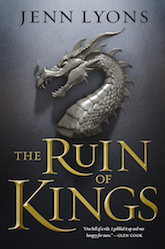

The Ruin of Kings
But now Eärendil and Elwing are given a choice. The choice of which kindred they wish to be counted among and “under which kindred they shall be judged.” Meaning, if they choose Elves, then they’ll become immortal and stay within Arda as long as it lasts. If they choose Men, then they will eventually die a mortal’s death and their spirits will go beyond the Circles of the World.
Well, Eärendil is already weary of the world; he just wants to be with Elwing, so he lets her choose for them both. Possibly as a counter-balance to Lúthien’s choice, Elwing chooses to be counted among the Elves. This couple’s circumstances are certainly quite different than that famous couple’s. Beren was always going to go with Men, but in this case, Eärendil can remain within his wife in immortality. While his heart gravitates to the people of his dad, to Men and to their mysterious fate, in the end his wife matters more to him. We’re also told this same choice will be given to their sons, Elrond and Elros, which presumably means Eärendil and Elwing learn now that their kids are, in fact, alive and still okay. This may seem a minor point not worth mentioning in so high a tale, but to them, such news would be paramount—a great relief to anxious parents, even if they’ll never get to go over and see them.
Meanwhile, Eönwë the herald goes down to see Eärendil’s companions, the three dudes in the boat who’ve been left to wait an awful long time by this point. And look, as unspeakably lovely as the shores of Aman must be with their pearl- and gem-strewn beaches and their majestic mountains looming overhead, there’s only so many things you can spy with your little eye while waiting for your captain to return—since he’s expressly forbidden you from getting out of said boat.
So yes, Eönwë, the most proficient weaponmaster in all of Arda, the one Maia who can outshine even most Valar in combat, is the one to politely resituate these fellows by placing them in another boat. Which, frankly, makes me chuckle a bit. We don’t really know what information Eönwë gives them as to what else is going on (what if he told them almost nothing?), but hey, the Valar have plans for Vingilot and it doesn’t include these three loafers being in it. Once they’ve hopped over to the back-up boat, a strong wind that is no doubt Manwë’s handiwork pushes them back out to the open Sea, back toward the East. So long, and thanks for all your help getting Eärendil here, gentlemen—but we’ll take it from here! See you when we see you.
At this point Vingilot gets a serious upgrade, like to the Nth degree. It was already the cream of the crop, but now they hallow it, bear it across Valinor to the very edge of the world: past the Gardens of Lórien, past the Halls of Mandos, and right over the Outer Seas that encircle all lands. Right through the Door of Night, that great portal that essentially leads out of the atmosphere—so take a deep breath!
This destination is Eärendil’s new and extraterrestrial vocation, even as Vingilot is given the power of flight.
Now fair and marvellous was that vessel made, and it was filled with a wavering flame, pure and bright; and Eärendil the Mariner sat at the helm, glistening with the dust of elven-gems, and the Silmaril was bound upon his brow. Far he journeyed in that ship, even into the starless voids; but most often was he seen at morning or at evening, glimmering in sunrise or sunset, as he came back to Valinor from voyages beyond the confines of the world.
So Eärendil has now ascended into the firmament on a new circuit, which seems a bit like a fixed path, but as we’ll see later, he’ll be able to deviate and even break from this course as needed.
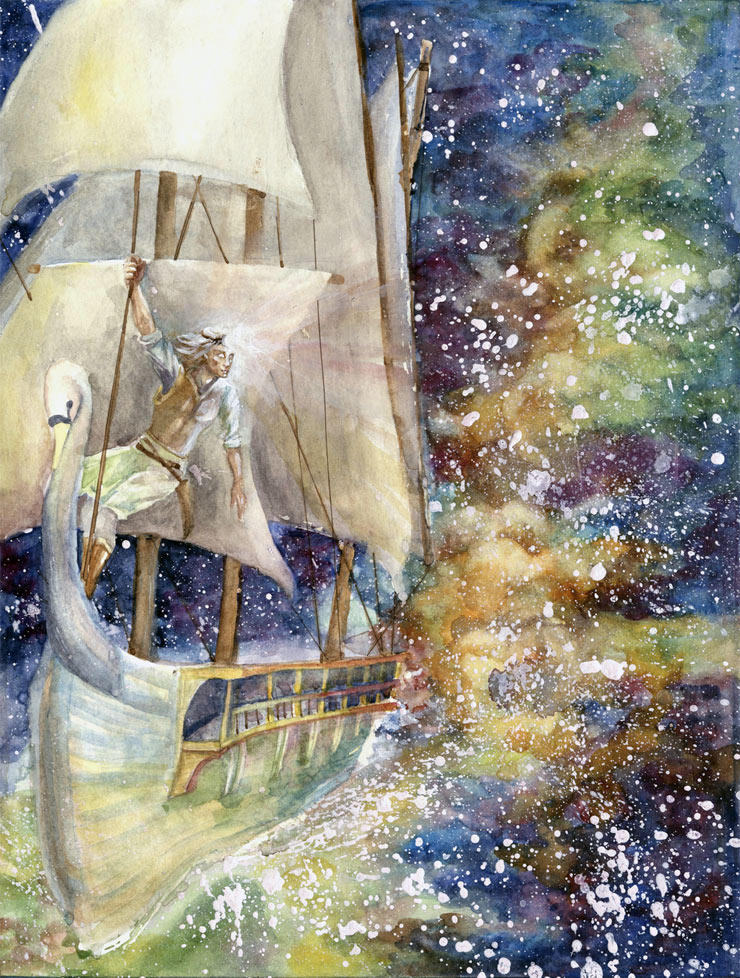
No one, but no one, gets to experience high adventure like Eärendil. He has become, well, a new star: both the morning and evening star, brightest of them all. And of course, it’s a bit of this light that Galadriel will one day gather and place in a phial amid the waters of her fountain. And it’s this light that will, in turn, be used to bring comfort to Frodo, ward off Shelob, and to puncture the defenses of the Two Watchers in Mordor.
So yeah, Bilbo knew the story long before we did:
and wings immortal made for him,
and laid on him undying doom,
to sail the shoreless skies and come
behind the Sun and light of Moon.
Or, to put it in a more Stygian way:
He climbed aboard his starship, he headed for the skies
Singing, come sail away, come sail away, come sail away with me!
Now this journeying through space Eärendil must do alone. Elwing would not be protected from the “cold and the pathless voids,” but it’s totally cool, as she prefers the earth and its winds. So the Valar give her some prime real estate with a seaside view somewhere on the coast near or within Eldamar, the Elvenhome—probably near Alqualondë. There a tower is built for her to dwell in, a place where sea-birds come and go.
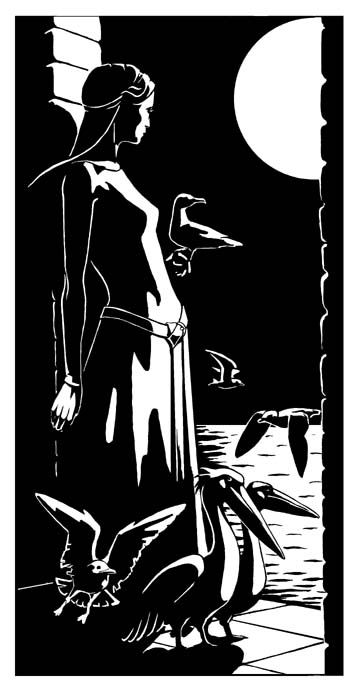
She learns how to speak with birds and she’s given the ability to transform herself freely into—whaddaya know!—bird form, with wings of “white and silver-grey”! Just as Ulmo had done for her at the outset of that last voyage. And so in avian form she can go out and meet her husband whenever he flies Vingilot down near Arda again. It’s an odd but utterly fantastical arrangement. He the star-bearing patroller, she the watcher in the tower.
Eagle-eyed readers might notice that in Bilbo’s song, a new ship was purportedly constructed for Eärendil as opposed to just giving Vingilot her space-faring upgrade. So is this some mythic disparity, an expositional technicality, or merely poetic license on Bilbo’s part? Most likely it’s the same boat thoroughly rebuilt.

In most iterations of Bilbo’s song—such as those presented in The Treason of Isengard (volume VII of the History of Middle-earth series)—the tell-tale line is “His boat anew they built for him.” But in The Lord of the Rings, Tolkien might have settled on an archaic usage wherein “new” essentially means “renewed.” Then again, as we know from elsewhere in the legendarium and even in The Silmarillion, not everything aligns perfectly in these stories, especially between poetic verse and the events they’re based on. In Bilbo’s song, Vingilot even loses her sail and the Silmaril is mounted on her mast, not Eärendil’s own head. One cannot help but wonder what Elrond, in hearing the hobbit’s song, muses about the specifics of his famous dad’s stellar journeys.
In any case, Eärendil is now sailing into destiny: the new star has at last arisen! And on Middle-earth, where Men wouldn’t necessarily notice it right away, the Elves sure do. They’ve all been stargazing since their awakening and they love starlight more than sunlight. So with Eärendil now ascended into the firmament on his new circuit, Maedhros and Maglor are quick to take notice of the distant light. It’s a sweet if sad little moment for these last two sons of Fëanor, because it gives them as a reprieve from their heavy Oath. Maedhros realizes that it must be a Silmaril they’re seeing in the Western sky.
And Maglor is glad of it, saying that if it is, then good, now everyone can enjoy its light…in a way that Fëanor would never have been okay with in the latter days of his life. And there’s just no way that Morgoth can claim this one again, that’s for damned sure. More importantly to these two Noldor, they can’t, either. It’s above their pay grade and out of bounds; outside their reach and the reach of the Oath. Totally fine with them! But it’s also kind of bittersweet, because look what it took—and how many have died for it?

Morgoth also takes note of the new and very bright star, and he’s not pleased, to say the least. But hey, at least he’s got Middle-earth under his boot now. The Children of Ilúvatar who remain are almost beneath his notice. Sure, there are some Elves over in the east beyond the Blue Mountains in regions like Eriador, but they’re just a bunch of woodland Moriquendi—no threat at all. And the Sindar and Noldor? Cowering under rocks and flitting about on their little boats in the south of Beleriand. No biggie. And Men? The so-called Elf-friends might as well be extinct, and the rest of the Secondborn out East are falling increasingly under his sway anyway.
His pride towers high, and in this hubris Morgoth believes no one’s going to ever raise their heads up again. The Valar have seemingly shut their eyes and closed their ears to Middle-earth, and he’s succeeded in alienating the Noldor from them. What are the Noldor gonna do? Cross the Great Sea and go crying home to Mommy and Daddy Valar to kiss their boo-boos and make it all better? Fat chance.
Meanwhile, and quite unbeknownst to him, the Valar are totally preparing to go after Morgoth. Like, big time. Now, the next few paragraphs of this chapter are tantalizingly scant of detail, leaving us to envision and decide what’s really going on. It’s even been debated on the Tolkien Professor podcast—a delightful listen, to be sure—whether the Valar themselves personally participate in the assault on Morgoth. It’s rightfully inconclusive because Tolkien just doesn’t say. But what we do know for sure is that the host of the Valar does include:
- The Vanyar. Or a least a whole bunch of them. Remember, the Vanyar are those Eldar who stayed obedient to the Valar all along, never rebelled, and were content to remain in Valinor. Morgoth never made inroads with them as he had the Noldor. They’re hardcore Valar loyalists.
- Some of the Noldor. That is, the 10% that didn’t follow Fëanor + those who started to but repented after the Kinslaying and doubled back. These are led by Finarfin, youngest and wisest son of the first King of the Noldor, Finwë.
- A whole lot of Maiar. Who can take all kinds of different forms, as we’ll see soon. These are all led by Eönwë.
Opting out of this last crusade are the Teleri, who are still mourning the loss of their people and their ships at the hands of the Fëanor-led Noldor, and so want nothing to do with them at all. But because of Elwing’s friendship with them, not to mention her family ties (after all, her great-grandfather was Thingol, first lord of the Teleri), they willingly lend both mariners and ships to the cause. Well, newer ships—they’ve had about five hundred years to make some more. Thus are the Vanyar and Noldor hosts able to venture back across the Great Sea. Presumably the Maiar don’t even need ships.
Whether the Valar go forth themselves is up to the reader to decide, but I personally think they do, or least some of them do. We’ll get to why in the next installment, which brings us to the War of Wrath and the close of the First Age! But I mainly think the Valar go forth because Tulkas the Strong has another fantastic knuckle sandwich with Morgoth’s name on it. And it’s getting awfully stale.
Top image from “The Shores of Valinor” by Ted Nasmith.
Jeff LaSala would want Jon Anderson (of Yes) to provide the soundtrack to the voyage of Eärendil, à la Olias of Sunhillow. Tolkien geekdom aside, Jeff wrote a Scribe Award–nominated D&D novel, produced some cyberpunk stories, and now works for Tor Books. He is sometimes on Twitter.










